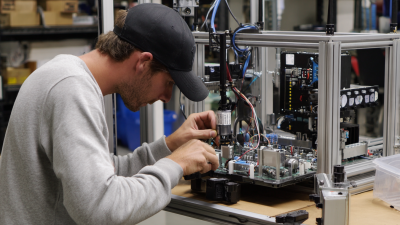How to Choose the Right Turnkey Assembly Services for Your Business Needs
Table of Contents
- Identifying Your Business Requirements for Turnkey Assembly Services
- Evaluating Supplier Capabilities: Key Metrics and Performance Indicators
- Understanding Cost Structures: Budgeting for Turnkey Assembly Services
- Assessing Quality Control Standards in Turnkey Assembly Providers
- Exploring Industry-Specific Solutions: Tailoring Services to Your Sector
- Analyzing Lead Times and Flexibility: Ensuring Timely Deliveries and Adaptability
- FAQS
- Conclusion
- Related Posts
In today’s fast-paced electronics market, selecting the right Turnkey Assembly Services is crucial for businesses seeking efficiency and quality in their manufacturing processes. As a leader in the industry, Zhuhai Xinrunda Electronics Co., Ltd., established in 2004, offers a comprehensive range of high-tech electronics manufacturing services, including SMT, PTH, COB, and Coating. With our commitment to innovation and excellence, we understand the complexities that come with production needs and the importance of streamlined operations. This guide will help you navigate the key considerations when choosing Turnkey Assembly Services, ensuring that you partner with a provider that aligns with your specific business requirements and goals.

Identifying Your Business Requirements for Turnkey Assembly Services
When selecting turnkey assembly services for your business, it is crucial to first identify your specific requirements. Understanding the components and technologies involved in your product is essential. For example, if your business involves high-precision electronics, you may require a service provider with expertise in Surface Mount Technology (SMT) and Pin Through the Hole (PTH) assembly. Evaluating the capabilities of potential partners in delivering these services effectively can directly influence your product quality and production efficiency.
Zhuhai Xinrunda Electronics Co., Ltd., established in 2004, exemplifies a reliable partner in the electronics manufacturing sector. With a commitment to providing comprehensive services like SMT, PTH, COB, and coating, they cater to various industry needs. By aligning your business requirements with the specialized offerings of companies like Xinrunda, you can ensure that your assembly services are tailored to enhance your operations while maintaining high standards of quality and reliability in your final products.
Evaluating Supplier Capabilities: Key Metrics and Performance Indicators
When selecting turnkey assembly services, it's essential to evaluate supplier capabilities through specific metrics and performance indicators. Key metrics such as production capacity, lead times, and quality control processes should be at the forefront of your assessment. A supplier's ability to meet your volume requirements without sacrificing quality or delaying delivery is crucial. Look for evidence of their past performance and their ability to scale operations in response to your needs.

Equally important are performance indicators that reflect a supplier's commitment to excellence. These may include customer satisfaction ratings, defect rates, and compliance with industry standards. A supplier that consistently receives high ratings from clients indicates a reliable partnership. Additionally, understanding their approach to quality assurance—such as certifications or ongoing training programs—can provide insights into their operational integrity. By focusing on these key performance indicators, you can ensure that the chosen assembly service aligns with your business goals and expectations.
Understanding Cost Structures: Budgeting for Turnkey Assembly Services
When budgeting for turnkey assembly services, understanding cost structures is essential for making informed business decisions. According to industry reports, the average cost of turnkey assembly services can range from $50 to $100 per labor hour, depending on the complexity of the project and the expertise required. Businesses must consider not only labor costs but also factors such as materials, overhead, and shipping fees. A detailed breakdown of these costs can help in allocating the right budget for each project phase, ensuring there are no surprises down the line.
Furthermore, integrating a comprehensive cost analysis can lead businesses to choose the best service providers. A report from the Manufacturing Institute suggests that 70% of companies that perform thorough cost assessments have improved their profitability. Additionally, it's crucial to account for potential hidden costs, including quality assurance and post-assembly inspections, which can add up significantly. By aligning budget expectations with realistic service offerings, businesses can enhance both operational efficiency and financial health.
Assessing Quality Control Standards in Turnkey Assembly Providers
When choosing a turnkey assembly service provider, assessing quality control standards is paramount. Companies must ensure that their chosen partner adheres to stringent quality protocols that align with industry benchmarks. In sectors such as electronics, where precision is vital, quality control systems like Six Sigma and ISO certifications serve as indicators of a provider's commitment to excellence. A recent report indicates that manufacturers who implement robust quality management systems can reduce defects by up to 70%, underscoring the importance of these standards.
Tips: Always request documentation of a provider’s quality control process, including any certifications they hold. Investigating their history of compliance with industry regulations is also crucial in understanding their reliability.
Additionally, consider the agility of the provider, especially given the current trend towards lean and agile manufacturing methods across industries. This flexibility is particularly important in the pharmaceutical sector, which is seeking to enhance global patient access by overcoming regulatory barriers. A proactive approach in selecting a partner who demonstrates an ability to adapt and innovate in their processes can significantly impact your business model.
Tips: Engage in discussions about their capacity for rapid prototyping and scalability during peak demand periods, as these factors can influence your operational efficiency and product time-to-market.
How to Choose the Right Turnkey Assembly Services for Your Business Needs - Assessing Quality Control Standards in Turnkey Assembly Providers
| Provider Type | Quality Control Standard | Certifications | Turnaround Time | Cost Range |
|---|---|---|---|---|
| Electronics Assembly | ISO 9001 | IPC-A-610 | 2-4 weeks | $5,000 - $20,000 |
| Mechanical Assembly | Six Sigma | AS9100 | 3-6 weeks | $10,000 - $50,000 |
| Consumer Goods Assembly | ISO 13485 | CE Mark | 1-3 weeks | $3,000 - $15,000 |
| Automotive Assembly | IATF 16949 | ISO/TS 16949 | 4-8 weeks | $15,000 - $100,000 |
Exploring Industry-Specific Solutions: Tailoring Services to Your Sector
When choosing turnkey assembly services tailored to specific industry needs, understanding the unique requirements of your sector is essential. The telecom sector, for instance, is witnessing a significant evolution, with the telecom operations management market projected to grow as operators seek solutions in network management, customer and product management, and billing systems. According to recent analysis, mobile operators and internet service providers are increasingly investing in these areas, driven by the need to enhance operational efficiency and customer satisfaction.
Similarly, the smart manufacturing market is on a rapid growth trajectory, expected to expand from $394.35 billion in 2025 to $998.99 billion by 2032, reflecting a compound annual growth rate (CAGR) of 14.2%. This growth encourages the adoption of tailored assembly services that integrate advanced technologies and data-driven solutions to meet the specialized demands of manufacturers. As sectors like telecommunications and manufacturing navigate these complexities, the right assembly solutions can significantly impact productivity and competitiveness. Leveraging industry-specific services ensures that businesses can adapt to evolving market conditions while optimizing their operational capabilities.
Turnkey Assembly Services by Industry Sector
Analyzing Lead Times and Flexibility: Ensuring Timely Deliveries and Adaptability
When selecting turnkey assembly services, businesses must focus on lead times and flexibility to ensure timely deliveries and adaptability to changing needs. The global e-commerce logistics market is expected to see significant growth approaching $1.9 trillion by 2032, with a compound annual growth rate of 20.04%. This rapid expansion highlights the importance of efficient logistics solutions that turnkey assembly services can provide. Companies need to evaluate whether their chosen service can adapt to fluctuating demands without compromising delivery schedules.
**Tips:** Look for providers that can demonstrate a track record of meeting tight deadlines and offer scalable solutions. Additionally, assess their ability to navigate logistical challenges, including supply chain disruptions and varying production capacities. Another essential factor is their response time to changes in order quantities or specifications, which can greatly enhance a company’s ability to stay competitive in a fast-paced market. By prioritizing these aspects in your selection process, you can ensure that your business remains agile and responsive.

FAQS
: Businesses should consider labor costs, materials, overhead, shipping fees, and potential hidden costs such as quality assurance and post-assembly inspections when budgeting for turnkey assembly services.
The average cost of turnkey assembly services ranges from $50 to $100 per labor hour, depending on the project's complexity and the expertise required.
A comprehensive cost analysis helps businesses choose the best service providers and aligns budget expectations with realistic service offerings, which can enhance operational efficiency and financial health.
Companies should assess if the provider adheres to stringent quality protocols, such as Six Sigma and ISO certifications, which are indicators of quality commitment.
Manufacturers who implement robust quality management systems can reduce defects by up to 70%, highlighting the importance of adhering to quality control standards.
Companies should request documentation of the provider’s quality control processes, including any certifications they hold and their compliance history with industry regulations.
It is crucial, especially in industries like pharmaceuticals, as flexibility and adaptability can significantly impact your business model and operational efficiency.
Engage in discussions about the provider's capacity for rapid prototyping and scalability during peak demand periods, as these aspects influence operational efficiency and product time-to-market.
Conclusion
In the quest for the right Turnkey Assembly Services, businesses must first identify their specific requirements to ensure that the chosen provider aligns with their operational needs. A thorough evaluation of supplier capabilities is essential, focusing on key metrics and performance indicators that reflect their ability to deliver quality service. Understanding the cost structures involved allows companies to budget effectively for these services without sacrificing quality.
Moreover, it is crucial to assess the quality control standards upheld by potential turnkey assembly providers and explore industry-specific solutions that can be tailored to meet unique sector demands. Finally, analyzing lead times and the flexibility of service offerings ensures that businesses can count on timely deliveries and adaptability in a rapidly changing market. With Zhuhai Xinrunda Electronics Co., Ltd.'s expertise in electronics manufacturing services, businesses can confidently select the right turnkey assembly partner for their needs.
Related Posts
-

Innovative Assembly Manufacturing Trends Shaping 2025 and Essential Tactics for Global Buyers
-

Mastering Box Build Assembly Services: A Step-by-Step Tutorial for Beginners
-

Championing Excellence in Export with Best Printed Circuit Board Assembly from China
-

Step-by-Step Guide to Successfully Navigating Custom PCB Assembly for Your Business Needs
-

Ultimate Checklist to Choose the Best Motherboard with Processor for Your Build
-

10 Effective Tips for Surface Mount Assembly Process Optimization
Blog Tags:

